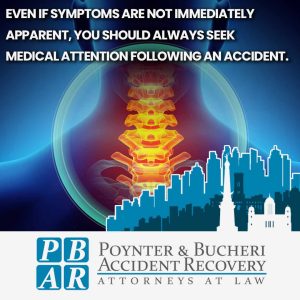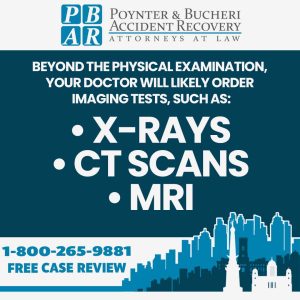Neck and whiplash injuries are some of the most common types of back injuries that accident victims suffer following a car accident. The neck and spinal column are sensitive body parts that can easily become damaged even after minor car incidents. Though minor neck injuries often require little medical treatment and can heal on their own, severe car accidents can cause more devastating cervical neck injuries.

If you become injured after a car accident, you may be eligible to receive compensation for your neck or back injuries and other damages.
Poynter & Bucheri’s Indianapolis personal injury attorneys can help injured clients prove another party is guilty of causing the neck injury accident and file a personal injury claim against them or their insurance. Unfortunately, it is not uncommon for insurers and the at-fault driver’s attorneys to deny claims or to reduce compensation amounts to less than what an injured accident victim deserves.
For this reason, it is in your best interest to work with a personal injury lawyer who will advocate for your rights, meet all the court’s deadlines, manage filings, and ensure you receive adequate compensation.
At Poynter & Bucheri Accident Recovery, our team will do everything possible to help you and your loved ones seek justice and get the compensation you need to recover and move on with your life. We will walk you through your personal injury case and the legal process to ensure all necessary steps are taken to win your case.
Recovering from whiplash or other severe neck and back injuries can be challenging, but our compassionate team of experts do the hard work for you so you can focus on what matters most—your health and recovery.
Let the Law Office of Poynter & Bucheri fight for your rights to protect you and your family. Call us today at 1-800-265-9881 for a complimentary neck injury lawsuit case review.
What Kind of Compensation Can I Get After Sustaining a Neck Injury in a Car Crash?
There is no way to determine exactly how much money you will be awarded when you file a claim for a neck injury sustained in a motor vehicle accident. It can vary depending on insurance policy coverages, how bad the neck injury damage is, what kind of pain and suffering you are experiencing, and other damages. Many factors will be considered before a settlement amount can be determined.
Damages you can receive compensation for after an injury include:
- Medical expenses and bills
- Lost wages if you have to miss work
- Loss of future earning potential if your injury results in permanent damage that affects your ability to return to work
- Property damages
- Physical pain and suffering
- Emotional distress and trauma
When neck injury damages are accounted for, and the insurance company provides a settlement amount, you may still feel that the compensation you are awarded is insufficient to cover your medical bills, physical therapy, lost wages, and other expenses.
When this happens, a neck injury attorney helps clients file neck injury lawsuits to fight the insurance companies for a higher settlement amount.
How Do Neck and Whiplash Injuries Occur?

Neck injuries and whiplash-associated disorders can occur when there is sudden force placed on the body, causing the neck and upper torso to jerk or whip around. Even minor incidents that cause little force can result in the neck tweaking or moving suddenly, which strains the neck muscles.
Numerous types of incidents can cause neck injuries, but car accidents tend to be the most common cause, particularly rear-end collisions.
Other types of accidents causing neck injuries and whiplash that personal injury attorneys can help with include:
- Truck accidents
- Motorcycle accidents
- Cycling accidents
- Boating accidents
- Fall accidents
- Sports injuries
- Workplace accidents
- Pedestrian accidents
- Slip and fall accidents
If you were injured in a serious accident and suffered a neck injury, you may be entitled to receive compensation for your damages.
Contact one of PBAR’s experienced neck injury attorneys today at 1-800-265-9881 for a free consultation and case review. We’re expert personal injury lawyers, helping neck injury victims of motor vehicle accidents recover money for many neck injuries.
What Is Whiplash?

Whiplash is a type of neck injury that occurs when the neck suddenly whips back and forth. Doctors may also refer to whiplash as back and neck sprains or strains. When the neck is forced beyond its typical range of motion, the soft tissues can become overextended and strained.
Though whiplash symptoms can be painful, it is generally considered a more minor neck injury. Neck pain medications and rest are often all that are suggested, but in some situations, the neck injury can lead to long-term chronic pain and discomfort.
When an injured person suffers from whiplash due to a work-related incident, workers’ compensation benefits may offset some medical expenses but rarely compensate them for all of their losses.
What Other Neck Injuries Can Occur After an Auto Accident?

When whiplash occurs, other back and neck injuries may also happen during a car accident. Typically, the severity of the back or neck injury will coincide with the accident’s severity.
Minor accidents will likely only result in minor or mild conditions, while severe back or neck injury accidents can lead to more serious neck injuries and complications.
Some common neck injuries seen in patients involved in auto accidents include:
- Neck fractures: When the neck or cervical spine is fractured or broken, it is a severe and life-threatening injury that will require immediate medical attention. These types of injuries often lead to paralysis or even death because they can pierce, pinch, or sever the spine.
- Bruising and lacerations: Trauma to the skin around the neck can cause cuts, bruises, or even deep lacerations. Cuts or lacerations often occur from broken glass in the car or other objects striking against the neck. Lacerations come with a risk of infection. Severe bruising and swelling can damage the surrounding tissue, impede circulation, and damage sensitive tissue.
- Slipped or herniated discs: Your neck is connected to your cervical spine. When the neck is injured in an accident, it can cause discs in your spinal column to slip, herniate, rupture, or bulge. In some cases, damaged discs can compress against the nerves of the spinal cord, which can cause permanent nerve damage or paralysis.
- Pinched nerves: There are many nerves all over our body, especially in the neck. When bones, muscles, or tendons are damaged, they can compress against the surrounding nerves in the neck, which can cause significant neck pain, numbness, and tingling. Pinched nerves are typically agitated by movement.
- Cervical spondylolisthesis: Our necks are also connected to the bones in our vertebrae. When the neck becomes injured, it can cause parts of our vertebrae to dislocate and slip out of alignment. Similar to slipped discs, vertebral bones that become damaged can compress against the nerves in the spinal cord, causing further damage and pain.
- Muscle spasms: Muscle spasms are a common symptom of neck injuries sustained in car accidents. Symptoms include twinges in your shoulders, back, and arms. Typically, these spasms are due to muscles tensing up or being overstretched during the impact. Swelling and inflammation put pressure on the nerves surrounding the affected muscles.
Each experienced personal injury attorney at Poynter & Bucheri knows how to get injured clients the compensation they deserve.
Contact Indianapolis’ best neck injury lawyers today to speak with a personal injury lawyer about your injuries at 1-800-265-9881.
Neck and Whiplash Injury Symptoms

When you sustain a back or neck injury, you might not immediately feel any neck pain or experience symptoms of whiplash. With neck injuries caused by sudden trauma, it can take hours or even days for signs and symptoms to appear.
In other neck injury cases, you may feel the neck pain and experience symptoms immediately; it depends on the individual, the extent of their neck injury accident, and the exact type of neck injury they sustained.
Even if symptoms are not immediately apparent, you should always seek medical attention following an accident.
If you wait too long, the damage could worsen and lead to complications. When in doubt, seek medical attention.
Medical records showing that you were injured are also vital should you decide to hire a neck injury lawyer experienced with personal injury claims.
Common signs and symptoms of neck and back injuries (including soft tissue injuries) can include:

- Neck pain
- Stiff neck
- Throbbing neck pain
- Chronic pain that radiates from your neck and back
- Tingling or numbness in the arms
- Dizziness
- Headaches
- Nausea
- Fatigue
- Muscle spasms in your neck
- Difficulty sleeping
- Blurred vision
- Memory problems
- Irritability
- Ringing in your ears
How Are Neck Injuries and Whiplash Treated?
If you suspect you have sustained a neck injury, you should see your doctor or visit an emergency room immediately. A doctor will ask questions about how your injury occurred, what you were doing at the time, and what symptoms you’re experiencing.
Your healthcare provider will usually perform a physical examination that assesses your neck pain, range of motion, and reflexes. They will ask questions about your daily activity to establish your normal functioning and pain level. In workman’s comp and sports injuries, the doctor’s exam and diagnosis will be provided.
Beyond the physical examination, your doctor will likely order imaging tests, such as:

- X-rays
- CT scans
- Magnetic resonance imaging (MRI)
After the doctor determines the neck or back injury victims sustained and how bad it is, they will suggest treatment options. The options available to you will vary depending on how bad the injury is and your level of neck pain.
Treatment options may include:
- Prescription pain relievers
- Muscle relaxants
- Rest and application of heat or ice
- Numbing or steroid injections
- Physical therapy
- A neck brace to stabilize the area and limit movement
- Surgery for more serious injuries that involve the spine or vertebrae
- Acupuncture
- Massage
- Chiropractic care
- Electric nerve stimulation
The recovery time for neck injuries can vary depending on the damage’s severity. Some mild neck injuries may only take a few days to heal, while other, more severe injuries can take weeks or even months. In some cases, sudden trauma or neck injuries can lead to severe damage that can affect you for the rest of your life, such as paralysis.
If you or a loved one have neck fractures, neck sprains, or other injuries related to an accident, contact our neck injuries lawyers at 1-800-265-9881 to schedule a free consultation.
What Proof Do I Need To File a Neck-Related Personal Injury Claim?
Proving liability in a neck-related personal injury claim involves demonstrating that another party’s negligent or wrongful actions directly caused your neck injury. Liability can be established through various means, depending on the circumstances of the accident.
Here’s what you’ll typically need to prove liability in neck injury claims:

Duty of Care: The first step in proving liability is establishing that the defendant owed you a duty of care. This duty of care is a legal obligation to act reasonably and prudently to prevent harm to others.
For example, drivers have a duty to operate their vehicles safely, property owners have a duty to maintain safe premises, and employers have a duty to provide a safe work environment.
Breach of Duty: Once a duty of care is established, you must demonstrate that the defendant breached that duty through negligent or wrongful conduct. This breach may involve reckless driving, failure to maintain property safely, or failure to adhere to workplace safety regulations.
In the context of a neck injury claim, examples of breach of duty could include causing a car accident due to distracted driving, failing to address hazards that contribute to a slip and fall incident, or neglecting to provide proper training or equipment to prevent workplace accidents.
Causation: Establishing causation is crucial in proving liability. You must show that the defendant’s breach of duty was the direct cause of your neck injury. This requires demonstrating that someone else’s negligence was a substantial factor in bringing about your injury.
For instance, if you were rear-ended in a car accident and subsequently suffered a neck injury, you would need to prove that the collision caused your neck injury and that it would not have occurred but for the defendant’s negligent driving.
Foreseeability: In some cases, liability may also hinge on whether the defendant could reasonably foresee that their actions could harm others. If the defendant should have reasonably anticipated the risk of injury to you or others, they may be held liable for any resulting harm.

For example, if a property owner fails to repair a broken handrail despite knowing that it poses a hazard, and someone subsequently falls and develops a neck or back injury, the property owner may be liable for failing to address the foreseeable risk of harm.
Evidence: To substantiate your claim and prove liability, you must gather and present evidence supporting your allegations. This may include witness testimony, accident reports, photographic evidence, medical records, expert opinions, and any other documentation relevant to the circumstances of the accident and the extent of your neck injury.
An experienced neck injury lawyer will help you gather substantial evidence to strengthen your case and increase the likelihood of getting the compensation you deserve during a neck injury lawsuit.
Indianapolis Neck Injury Lawyers
When you are suffering from a neck injury, you need a compassionate yet aggressive neck injury lawyer who cares about you and will fight for your rights. Let the neck injury lawyers at the Poynter & Bucheri Law Office protect you and your family and get you the compensation you need and deserve to recover from your injuries.
Contact our legal team at 1-800-265-9881 to schedule a free consultation with an Indianapolis spinal cord injury lawyer to start working on your neck injury claim.
